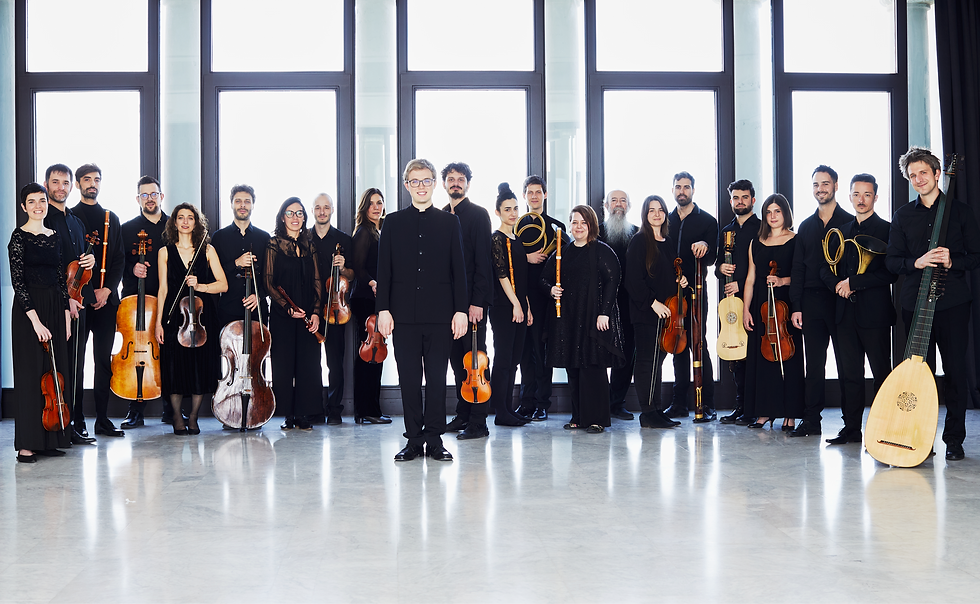
Our
history
The Ensemble Los Elementos was born in 2018 with the aim of performing for the first time with period instruments the zarzuela Vendado es Amor, no es ciego, by the composer José de Nebra, one of the greatest exponents of Spanish baroque. Founded by Alberto Miguélez Rouco, it is made up of musicians of different nationalities, most of them linked to the Schola Cantorum Basiliensis in Switzerland. One of its main objectives is the performance, recovery and dissemination of Spain's rich musical heritage, especially that of the 18th century. In 2019 the group recorded Vendado es Amor, no es ciego by José de Nebra in collaboration with the Schola Cantorum Basiliensis for the Glossa record label, a recording that obtained an excellent national and international repercussion, which led them to perform this zarzuela at the Festival de Amigos de la Ópera de La Coruña in 2020. Their second disc, Cantadas, a solo album by Alberto Miguélez Rouco dedicated to the sacred works of José de Nebra and Francisco Corselli, will be released in 2021, and the zarzuela Donde hay violencia, no hay culpa, also by José de Nebra, in October 2022, being the first world recording of the same.
Recently the ensemble has participated, together with Miguélez Rouco, in the cycle Universo Barroco at the Auditorio Nacional de Música in Madrid with Vendado es Amor, no es ciego; in February 2023 they will revive the great Miserere a 8 by José de Nebra in Basel; and in March 2023 they will perform Donde hay violencia, no hay culpa at the Teatro de la Zarzuela in a production by Rafael Villalobos.
Upcoming engagements include the opening of the Stockholm Early Music Festival in June 2023 and the recording of José de Nebra's opera Venus and Adonis.

Alberto Miguélez Rouco
Musical direction
He was born in La Coruña, finishing with the pianist Cristina López the Professional Degree in 2012 with an Extraordinary Prize. Simultaneously, he carried out his vocal training with the singing teacher and tenor Pablo Carballido del Camino. In 2015, he finished his higher studies in singing at the Musik Akademie of Basel in Switzerland with the mezzo-soprano Rosa Domínguez and later completed his training with two master's degrees in perfomance and singing pedagogy. He also studies harpsichord and basso continuo at the same institution with Francesco Corti, Giorgio Paronuzzi. In opera, he has played the role of Ascalax in Telemann's Orpheus with René Jacobs (Basel), Armindo in Handel's Partenope with William Christie (Paris, Barcelona, Lucerne), Adelberto in Handel's Ottone (Innsbruck Festwochen der Alte Musik), La Speranza in L'Orfeo de Monteverdi (Palma) etc.
As an oratorio soloist, under the direction of René Jacobs, he has sung the role of Amor Celeste in Caldara's Maddalena ai piedi di Cristo, the alto in Israel in Egypt and Bach's Johannes-Passion. He also sings the Messiah, the Ode for the birthday of Queen Anne or Il trionfo del Tempo e del Disinganno by Handel, the Miserere by Nebra, Il martirio di San Vito by Pasquini, the Magnificat by Bach or the Vespro della Beata Vergine by Monteverdi. He attends master classes by Mariella Devia, Margreet Honig, Sara Mingardo and Philippe Jaroussky and is directed by directors such as René Jacobs, William Christie, Christophe Rousset, Paul Agnew, Gabriel Garrido or Josep Pons. As a soloist, he has worked with orchestras such as Les Arts Florissants, the Freiburger Barockorchester, the Bach Vereniging, Les Talens Lyriques, the Galicia Symphony Orchestra or the Elyma Ensemble.
Winner of the X Jardin des Voix, he went on a world tour (2021-2023) with Les Arts Florissants and William Christie and playing the role of Armindo in Handel's opera Partenope. Since September 2020, he has been part of the Philippe Jaroussky Musical Academy. Miguélez Rouco has recently participated, as a singer, in a concert dedicated to the cantatas of José de Torres in the Notas del Ambigú cycle of the Teatro de la Zarzuela. Among his upcoming commitments is the role of Ottone in L'incoronazione di Poppea by Monteverdi at Oper Köln under the direction of Georg Petrou and Alessandro Quarta.

Claudio Rado
Concert master
Claudio Rado was born in 1990 in Treviso, near Venice, and began studying violin at the age of five. In 2007 he graduated from the "A. Steffani" conservatory of Castelfranco Veneto in the class of Giorgio Fava and obtained a scholarship from Professor Davide Zambon.
Later he studied with Sonig Tchakerian at the "Accademia Nazionale di Santa Cecilia" in Rome. He was invited to perform Ysaye's solo sonata "Ballade" during the concert of the best students of the Accademia. The concert was held in the hall "Parco della Musica".
In the summer of 2010 he attended a master class conducted by Giuliano Carmignola at the "Accademia Chigiana di Siena", obtaining a full scholarship and a special certificate of merit. Since 2012 he has been playing with the Russian pianist Eugenia Nalivkina. Price-Winner of numerous national competitions and scholarships, the duo studied at the "Accademia Trio di Trieste" in Duino under the direction of Trio di Parma.
Claudio has always expressed a particular interest in Baroque music.
In 2016 he was selected as a member of the European Union Baroque Orchestra, where he also acted as assistant to the first violin and leader of the second violins. With them he toured England, Germany, Luxembourg, Italy, Belgium, Croatia, etc.
Since 2016 he has been exclusively dedicated to early music played on period instruments. Quite active as a soloist, first violin in ensembles and orchestras, his collaborators include Roy Goodman, Lars Ulrik Mortensen, Alfredo Bernardini, Andrea Marcon, I Sonatori de la Gioiosa Marca, Stefano Montanari, Venice Baroque Orchestra, "La Cetra" Barockorchester, Il Pomo d'Oro etc. With them he has performed in some of the most important music halls in Europe and America.
In June 2019 Claudio obtained a Master cum laude at the Schola Cantorum Basiliensis with Leila Schayegh.



